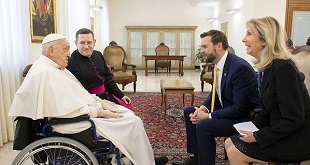
All revenue from ticket sales, international broadcasting rights, and sponsorships goes directly to FIFA
COMMENT | ANDREW ZIMBALIST | Whom would you trust more, Russian President Vladimir Putin or Chicago Mayor Rahm Emanuel? Whereas Putin is reveling in the attention that Russia is receiving as host of the 2018 World Cup, Emanuel has informed the U.S. Soccer Federation and FIFA that Chicago has no interest in serving as a host city when the event comes to North America in 2026. Canada and Mexico will each host ten matches, and the United States will host another 60. So why is the third-largest U.S. city taking a pass?
To understand what it means to host a global sporting event, consider the fact that Putin’s government spent $51-70 billion to stage the 2014 Winter Olympics in Sochi, and is projected to spend at least $14 billion hosting the current World Cup, which runs through July 15. Russia’s budget provided for the construction of seven new stadiums – including one in St. Petersburg that cost around $1.7 billion – and renovations to five other venues. And that does not even account for the additional expenses for training facilities, lodging, expanded infrastructure, and security.
Chicago, having already hosted the opening ceremony and first match of the 1994 World Cup, has adopted quite a different mindset. Emanuel’s spokesperson, Matt McGrath, recently issued a statement explaining that, “FIFA could not provide a basic level of certainty on some major unknowns that put our city and taxpayers at risk.” FIFA, McGrath alleges, was demanding something tantamount to a “blank check,” including an “open-ended ability to modify the agreement … at any time and at their discretion.”
Moreover, FIFA would have required that Soldier Field – home to the Chicago Bears football team – be taken out of use for two months prior to the tournament. In the end, Emanuel’s office concluded that, “The uncertainty for taxpayers, coupled with FIFA’s inflexibility and unwillingness to negotiate, were clear indications that further pursuit of the bid wasn’t in Chicago’s best interests.”
In addition to holding anywhere from two to six games – potentially over the course of a number of weeks – World Cup host cities are expected to throw a “fan fest,” furnish training facilities for the teams, and provide extensive tax exemptions for a range of activities. In fact, FIFA prohibits both direct and indirect taxation on all income from the event, exempting continental soccer confederations, host-country broadcasters, and FIFA member associations, service providers, and contractors. It is little wonder, then, that Minneapolis and Vancouver have joined Chicago in declining the hosting honor.
To justify its imperious behavior, FIFA points out that, “[the] World Cup is a major sporting event that attracts global attention to the Host Country/Host Countries and provides the opportunity for significant financial investment in sporting and public infrastructure.” And that added attention and investment, FIFA claims, “may contribute to significant mid- and long-term socioeconomic benefits … as well as economic growth.”
But note the carefully qualified language. FIFA only goes so far as to promise an “opportunity for significant financial investment” in infrastructure, as well as attention and investment that “may contribute” to growth. In reality, scholarly evidence shows that the World Cup rarely benefits host countries and cities as much as FIFA would like the public, and public officials, to think.
For example, consider what Russia gets in exchange for its $14 billion-plus investment in this year’s event. While all of the revenue from ticket sales, international broadcasting rights, and sponsorships will go directly to FIFA, Russia will be left with seven new stadiums and five refurbished facilities that it does not need. And unless it demolishes these venues, it will have to spend tens of millions of dollars every year to maintain them. Meanwhile, hundreds of acres of scarce urban real estate will have been forfeited as sites for white elephants.
To be sure, images of sleek new facilities are being disseminated worldwide. But the optics are not necessarily working in Russia’s favour. Apparently, there was no hiding the 6,000 empty seats at the Uruguay-Egypt match on June 15.
If history is any guide, it is highly unlikely that the 2018 World Cup will increase Russia’s international investment or trade, boost its tourism industry, or strengthen its people’s commitment to physical fitness.
What it will do is instill a fleeting sense of national pride among a significant portion of Russians, while offering an ephemeral distraction from the country’s mounting problems. With or without the World Cup, oil-price volatility and international sanctions imposed in response to Putin’s 2014 annexation of Crimea will continue to darken Russia’s economic prospects and diminish ordinary Russians’ standard of living.
So, whom should you trust? I’m going with Emanuel.
****
Andrew Zimbalist, a professor of economics at Smith College, is the author of `Circus Maximus: The Economic Gamble Behind Hosting the Olympics and the World Cup’.
Copyright: Project Syndicate, 2018.
 The Independent Uganda: You get the Truth we Pay the Price
The Independent Uganda: You get the Truth we Pay the Price



